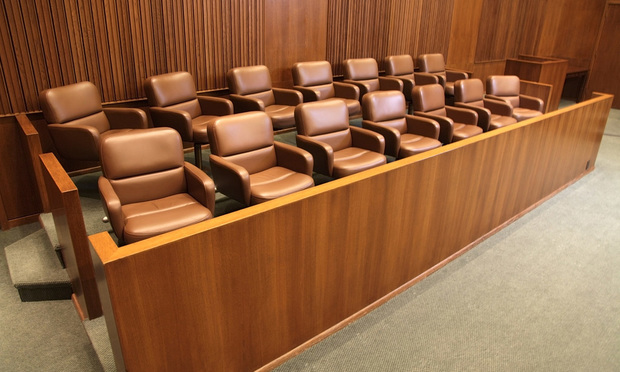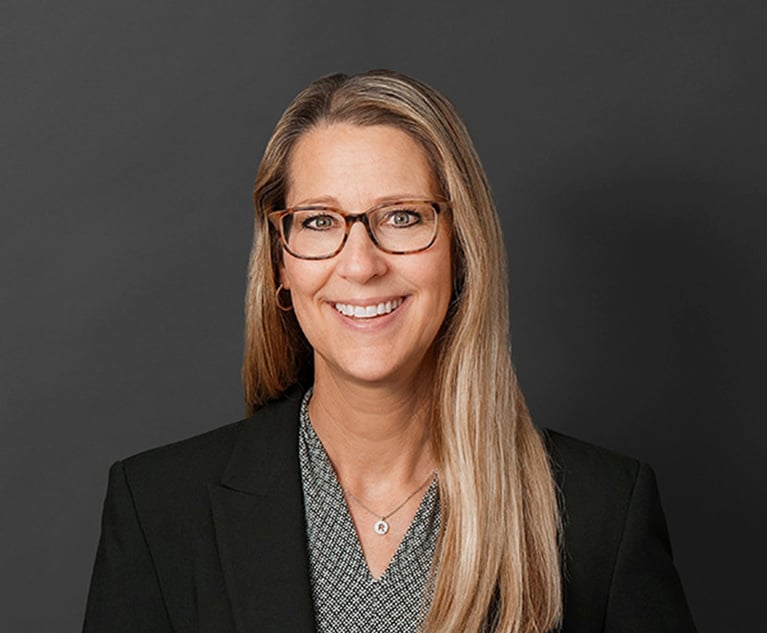Court: Faulty Jury Charge Did Not Taint Verdict Over Alleged Unnecessary Heart Procedures
A Westmoreland County trial judge was wrong to instruct a jury on the "two schools of thought doctrine" in a trial against a doctor accused of performing unnecessary cardiac stent procedures, but the flawed instruction did not ultimately contribute to the defense verdict, the Pennsylvania Superior Court has ruled.
February 28, 2019 at 01:38 PM
6 minute read
 Photo: Jason Doiy
Photo: Jason Doiy
A Westmoreland County trial judge was wrong to instruct a jury on the “two schools of thought doctrine” in a trial against a doctor accused of performing unnecessary cardiac stent procedures, but the flawed instruction did not ultimately contribute to the defense verdict, the Pennsylvania Superior Court has ruled.
Sensenich v. Morcos is the bellwether case in the In re Westmoreland Hospital Cardiac Stent Litigation, which arises from allegedly unnecessary cardiac stenting procedures performed by Dr. Ehab Morcos and Dr. George BouSamra.
According to defense counsel, 115 cases were initially filed and, after several were settled, more than 30 are still pending.
In Sensenich, a three-judge panel of the Superior Court affirmed a Westmoreland County jury's verdict in favor of Morcos, Westmoreland County Cardiology (WCC) and Westmoreland Regional Hospital and Excela Health.
According to the panel's Feb. 27 opinion, plaintiff Stephen Sensenich, along with his wife, filed suit alleging that Morcos performed unnecessary stenting procedures on him. Sensenich also brought a claim for corporate negligence against Excela, alleging that it had been on notice of a problem as of February 2008, when physicians from Latrobe Cardiology Associates, a general cardiology group owned by Excela, began complaining of unnecessary and excessive stenting practices by WCC's doctors, particularly Morcos and BouSamra.
In charging the jury, the trial court explained the two schools of thought doctrine, and instructed, “The defendant has the burden of proving by a fair preponderance of the evidence that a considerable number of recognized and respected professionals advocated the same course of treatment; that he is aware of these professionals advocating the same course of treatment at the time he treated the plaintiff; and that in treating the plaintiff he consciously chose to follow their recommended course of treatment.”
“If you decide that the defendant has met this burden of proof, then you should find for the defendant,” the instruction continued. “However, the plaintiff contends that the defendant was negligent in placing unnecessary stents into this particular plaintiff. The two schools of thought doctrine has no application to this type of claim, and you may not consider the doctrine regarding that claim of unnecessary stents.”
Ultimately, the jury found that Morcos did not fail to obtain Sensenich's informed consent, did not commit a battery, and was not negligent in his treatment. As a result of those findings, the jury did not reach the claims of corporate negligence against Excela and civil conspiracy among all the defendants.
In a precedential ruling, the appellate panel said the trial judge improperly referenced the two schools of thought doctrine in his jury instruction because it had no application to the claims at issue. The doctrine shields doctors from claims of negligence for treatments or procedures that have been approved by one group of medical experts, even where another group of medical experts endorses an alternative approach.
“The two schools of thought doctrine is a red herring in the instant case,” Judge Mary Jane Bowes wrote for the panel. “Despite the fact that this litigation turned on whether the placement of stents in Mr. Sensenich's LAD and circumflex arteries was medically indicated, Defendants managed to shift the focus of the litigation to the manner in which stenting was performed rather than whether the arteries should have been stented at all. From there, it was a short leap to the two schools of thought: healthy-to-healthy stenting versus spot stenting.”
However, Bowes noted that the trial judge “correctly recognized that the two methods of stenting had nothing to do with Dr. Morcos's decision to place even one stent in a vessel that was not sufficiently occluded to warrant that intervention, and refused to give the two schools of thought instruction with regard to the unnecessary stenting claim.”
“Nonetheless, it was seduced by defendants' novel argument that Excela's failure to respond earlier to Latrobe's complaints could be excused by the fact that WCC's practice of healthy-to-healthy stenting used more stents,” Bowes continued. ”The claims against Excela turned on whether the hospital was derelict in ensuring the safety of patients and supervising its physicians, and whether that negligence was a substantial factor in Mr. Sensenich undergoing two unnecessary medical procedures.”
But the only claims the jury reached were those related Morcos' stenting procedure and the Superior Court found that the trial judge had sufficiently instructed the jury that the two schools of thought doctrine did not apply to those claims.
For that reason, the court rejected the plaintiffs' reliance on the state Supreme Court's rulings in Levine v. Rosen and Sinclair by Sinclair v. Block, both of which involved defense verdicts being overturned because the trial court neglected to specify which claims the two schools of thought doctrine applied to.
“In contrast to the situations in Levine and Sinclair, the court herein specifically told the jury that the instruction was not applicable to the claims of unnecessary stenting against Dr. Morcos and that it could not consider it with regard to those claims,” Bowes said. ”The court's direction was clear and explicit. The only claims upon which the jury reached a verdict were those unnecessary stenting claims. We must presume that the jury followed the direction of the trial court and did not consider the defense with regard to those claims.”
Bowes was joined by Judges Jacqueline Shogan and Victor Stabile.
Counsel for the plaintiffs, Vincent Coppola of Pribanic & Pribanic in Pittsburgh, said he plans to file a petition for reargument, contending that the Superior Court should have addressed the fact that the trial judge never specifically instructed the jury that the two schools of thought doctrine did not apply to the battery and lack of informed consent claims, in addition to the negligence claim against Morcos.
Counsel for Westmoreland Regional Hospital and Excela, David Johnson of Burns White in Pittsburgh, said he thought the decision would provide important guidance for both the plaintiffs and defense as the Westmoreland Hospital Cardiac Stent Litigation moves forward.
“This was the bellwether case for a whole series of stent cases in Westmoreland County, so it's really nice to get the whole case affirmed,” Johnson said.
Counsel for Morcos and WCC, Lynn Bell of Davies, McFarland & Carroll in Pittsburgh, could not be reached for comment.
This content has been archived. It is available through our partners, LexisNexis® and Bloomberg Law.
To view this content, please continue to their sites.
Not a Lexis Subscriber?
Subscribe Now
Not a Bloomberg Law Subscriber?
Subscribe Now
NOT FOR REPRINT
© 2025 ALM Global, LLC, All Rights Reserved. Request academic re-use from www.copyright.com. All other uses, submit a request to [email protected]. For more information visit Asset & Logo Licensing.
You Might Like
View All


Penn State Dickinson Law Dean Named President-Elect of Association of American Law Schools
Trending Stories
- 1FTC Chair Lina Khan Sues John Deere Over 'Right to Repair,' Infuriates Successor
- 2‘Facebook’s Descent Into Toxic Masculinity’ Prompts Stanford Professor to Drop Meta as Client
- 3Pa. Superior Court: Sorority's Interview Notes Not Shielded From Discovery in Lawsuit Over Student's Death
- 4Kraken’s Chief Legal Officer Exits, Eyes Role in Trump Administration
- 5DOT Nominee Duffy Pledges Safety, Faster Infrastructure Spending in Confirmation Hearing
Who Got The Work
J. Brugh Lower of Gibbons has entered an appearance for industrial equipment supplier Devco Corporation in a pending trademark infringement lawsuit. The suit, accusing the defendant of selling knock-off Graco products, was filed Dec. 18 in New Jersey District Court by Rivkin Radler on behalf of Graco Inc. and Graco Minnesota. The case, assigned to U.S. District Judge Zahid N. Quraishi, is 3:24-cv-11294, Graco Inc. et al v. Devco Corporation.
Who Got The Work
Rebecca Maller-Stein and Kent A. Yalowitz of Arnold & Porter Kaye Scholer have entered their appearances for Hanaco Venture Capital and its executives, Lior Prosor and David Frankel, in a pending securities lawsuit. The action, filed on Dec. 24 in New York Southern District Court by Zell, Aron & Co. on behalf of Goldeneye Advisors, accuses the defendants of negligently and fraudulently managing the plaintiff's $1 million investment. The case, assigned to U.S. District Judge Vernon S. Broderick, is 1:24-cv-09918, Goldeneye Advisors, LLC v. Hanaco Venture Capital, Ltd. et al.
Who Got The Work
Attorneys from A&O Shearman has stepped in as defense counsel for Toronto-Dominion Bank and other defendants in a pending securities class action. The suit, filed Dec. 11 in New York Southern District Court by Bleichmar Fonti & Auld, accuses the defendants of concealing the bank's 'pervasive' deficiencies in regards to its compliance with the Bank Secrecy Act and the quality of its anti-money laundering controls. The case, assigned to U.S. District Judge Arun Subramanian, is 1:24-cv-09445, Gonzalez v. The Toronto-Dominion Bank et al.
Who Got The Work
Crown Castle International, a Pennsylvania company providing shared communications infrastructure, has turned to Luke D. Wolf of Gordon Rees Scully Mansukhani to fend off a pending breach-of-contract lawsuit. The court action, filed Nov. 25 in Michigan Eastern District Court by Hooper Hathaway PC on behalf of The Town Residences LLC, accuses Crown Castle of failing to transfer approximately $30,000 in utility payments from T-Mobile in breach of a roof-top lease and assignment agreement. The case, assigned to U.S. District Judge Susan K. Declercq, is 2:24-cv-13131, The Town Residences LLC v. T-Mobile US, Inc. et al.
Who Got The Work
Wilfred P. Coronato and Daniel M. Schwartz of McCarter & English have stepped in as defense counsel to Electrolux Home Products Inc. in a pending product liability lawsuit. The court action, filed Nov. 26 in New York Eastern District Court by Poulos Lopiccolo PC and Nagel Rice LLP on behalf of David Stern, alleges that the defendant's refrigerators’ drawers and shelving repeatedly break and fall apart within months after purchase. The case, assigned to U.S. District Judge Joan M. Azrack, is 2:24-cv-08204, Stern v. Electrolux Home Products, Inc.
Featured Firms
Law Offices of Gary Martin Hays & Associates, P.C.
(470) 294-1674
Law Offices of Mark E. Salomone
(857) 444-6468
Smith & Hassler
(713) 739-1250






